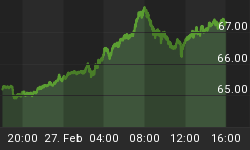For foreign investors, playing in the lucrative Chinese financial markets has been anything but easy or straightforward. Fortunately, this has been rapidly changing over the past few years with China’s equity, commodity and capital markets increasingly moving into the global investment mainstream.
And now, with trade tensions between the U.S. and China reaching fever pitch, Beijing is desperate to prove to the world that it’s not the economic or trade pariah that it is frequently made out to be by opening up its markets even further.
After the launch of its “internationalised” iron ore contract last year - the first of its kind for international investors - China now plans to expand the scope of its international commodities trading by adding a host of non-ferrous metals in a bid to hold more sway over global pricing of major commodity imports.
The Middle Kingdom plans to add international futures contracts for aluminum, copper, nickel, lead, zinc and tin to the Shanghai Futures Exchange (ShFE) in about two years’ time - quite a dramatic improvement to the current tally of only three contracts that are available to foreign investors. Related: Amazon Set To Leave Many Of Its Long-Time Vendors
Currently, overseas investors can only access iron ore contracts on the Dalian Commodity Exchange; crude oil futures on the Shanghai International Energy Exchange and plastics raw material purified terephthalic acid (PTA) futures contracts on the Zhengzhou Commodity Exchange.
The international crude oil futures on ShFE were able to hit an impressive turnover of 17.1 trillion yuan (US$2.48 trillion) in the 12 months since their March 2018 launch, proving the market is ready for prime time.
New level of openness
In a press conference presentation, chairman of the Shanghai Futures Exchange, Jiang Yan, revealed that the bourse plans to attain a ‘‘new level of openness’’ as regulators give increased access to yuan-denominated contracts to overseas investors. Jiang said ShFE plans to initially use the TSR 20 technically-specified standard rubber contract to lure in more international investors.
Despite the latest flare up in trade tensions with Washington, we have been witnessing a definite seismic shift in China’s economic multilateral relations with the outside world.
In April last year, Beijing lifted a cap on foreign ownership in Chinese finance firms, allowing foreign investors to own up to 51 percent interest in financial firms including securities firms, investment managers and life insurance providers. China's policymakers have for long imposed highly restrictive foreign ownership caps on many of its sectors, resulting in huge trade imbalances between the country and its major trading partners. For instance, due to caps in China’s financial sector, leading Wall Street banks such as JPMorgan Chase, Wells Fargo, Bank of America and Citigroup derive less than a percentage point of their revenues in China, far less than the 10 percent average by S&P 500 companies.
In June, Beijing also did something unprecedented after Shanghai and Shenzhen stock exchanges launched Chinese depositary receipts, or CDRs, that will allow Chinese investors to invest in Chinese tech giants such as Alibaba, JD.com, Baidu and Weibo that have preferred to list on American exchanges thus denying their homeland a chance to enjoy their often wild success.
Beijing’s sudden benevolence is partly self-serving though since its biggest concern is the large number of Chinese companies that have been listing on foreign soil. Related: What To Expect As Driving Season Kicks Off
This opening up is two-way though, with Wall Street doing its part to increase access to the Chinese market. In June 2018, leading index compiler MSCI added Chinese A-shares - yuan-denominated stocks that are traded on the mainland - to the Emerging Markets Index.
But perhaps even more significant, American investors can now play in China’s $13-trillion bond market after Bloomberg kicked off the process of onboarding 364 bonds to the Bloomberg Global Aggregate Index.
Weaker yuan
Yet, China’s efforts to open up its capital markets could end up having an unintended consequence - an even weaker yuan. As the People’s Bank of China (PBOC) allows more market forces to play a greater role in determining the value of China’s currency, the yuan is likely to become more volatile and likely weaken even further (the currency is down nearly seven percent against the dollar this year).
This might only serve to increase suspicions of currency manipulation by Washington. President Trump has repeatedly railed against currency manipulation, particularly by Beijing, as a weaker yuan favors China’s exports while weakening the U.S.’ - leading to huge trade deficits. A few days ago, the U.S. expanded the list of countries under surveillance for manipulating their currencies from 12 to 21 though China has been spared - for now.
By Alex Kimani for SafeHaven.com
















